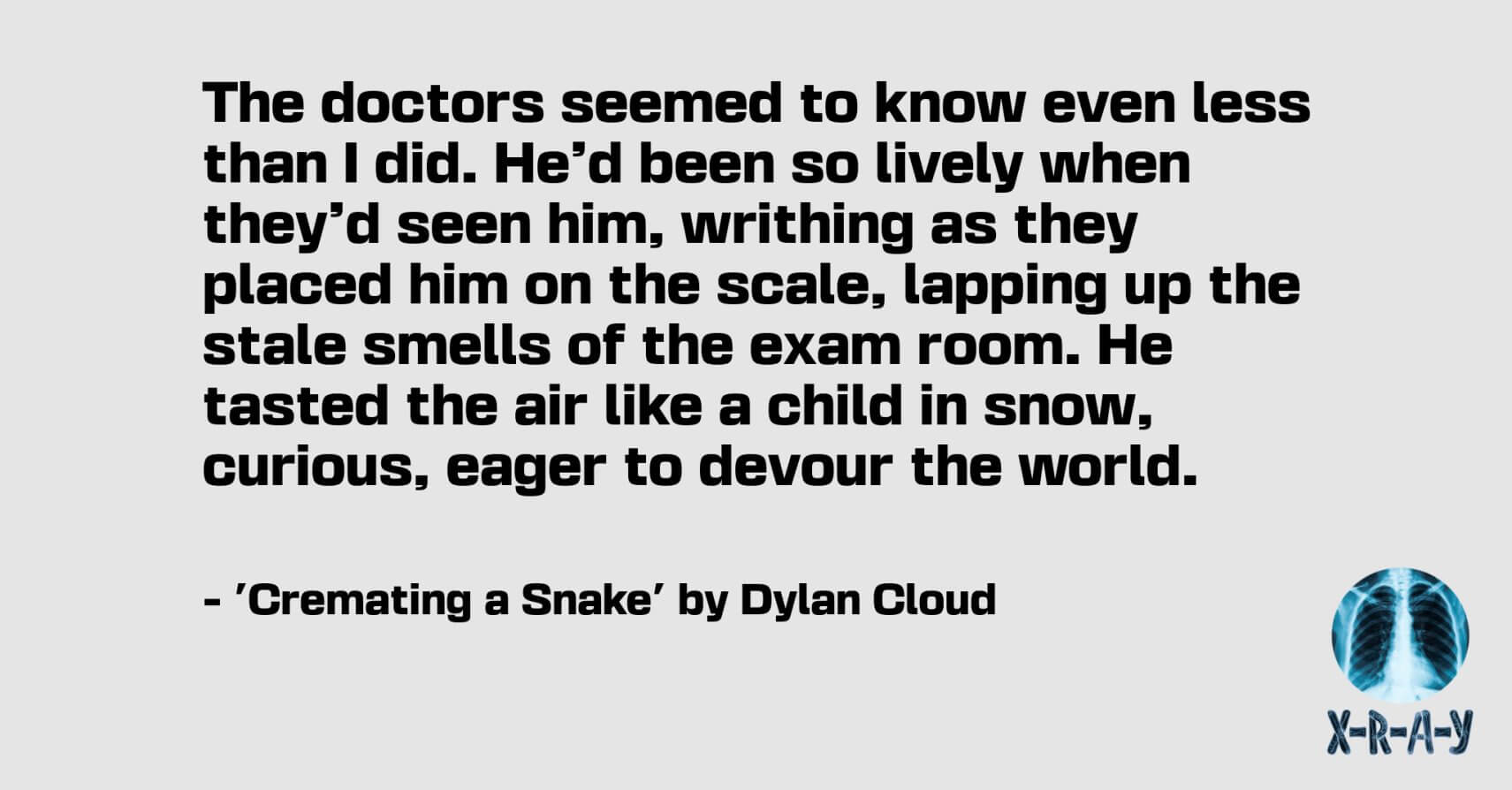It happened fast—a small wound opened in his side one day and soon his eyes were sunken, his mouth black. The doctors seemed to know even less than I did. He’d been so lively when they’d seen him, writhing as they placed him on the scale, lapping up the stale smells of the exam room. He tasted the air like a child in snow, curious, eager to devour the world. How could I make them understand? I had seen the sickness enter through his cut, the flicker of his being suffocated by pain. The pink infection crawling up his belly: too far, too fast. I couldn’t. He died.
I found his body that night. It was never easy to tell whether he was sleeping; it was the empty limpness in my fingers, the stillness of the skin and the illness swimming in the pus beneath that told me he was dead. This was how we had always communicated: in slithered Ss and Cs spelling out a secret language. He never smiled. Sometimes I could read hunger in the anxious loops he drew around his tank, or intelligence in the considered script with which he scaled a bookshelf. I wondered if the disease had begun before the cut and I had simply failed to read the signs. Only now could I be certain of what he was saying: I am dead, I am dead, IIIIIIIIIIIII.
But where to take him? The ground was hard and frozen, too cold a resting place for subtropical remains. The trash seemed unceremonious and sad, the rats greedy for a chance to turn the food chain on its head. The first few places I called laughed at me on the other end of the line: We do cats and dogs here, sir. Anything less domestic was too weird, too far-flung on the cladogram for funerary rites. Finally I found the number of a former veterinarian with four stars online who said that, for their feline rate, they would ‘process’ him—though when they mailed him back to me he would arrive in a little wooden box adorned with balls of yarn and mice and fish skeletons. That was fine, I said. He did like mice.
I wrapped him in a garbage bag, and we took the train to the outskirts of town. Out the window I saw factories spewing smoke that slithered up the sky and dissolved into the gray clouds overhead. No one else had ridden this far out on the line; the only other people on the platform were disinterested ticket-takers, warm and drowsy behind the fogged glass of their climate-controlled tanks. Huge, faceless trucks rattled past me on the street, shining their headlights in my eyes. I kept my hands in my pockets, the garbage bag tucked under my arm, my lips turning rigid in the blistering wind. At the address I’d been given I found a small office with a man who was surprised to see me. Behind his desk hung a posterboard filled with faded polaroids of border collies, tabby cats, and corgis posing with teary-eyed humans in the entryway I’d just come in. He accepted the bag and offered his condolences; he seemed tickled to have something to burn beyond his regular kindling, and asked me questions about reptile care and cuddling. As I turned to leave I noticed that one of his ears was missing—mangled, as if bitten off.
It was dark when I walked back onto the street. It had started to snow. One by one the streetlights flickered on; a pale shimmer appeared to glow upon the factory walls. Scales of silver spray paint under spray paint, shining with the names of those who’d vandalized this place before they left it. I looked up at the great smokestacks pouring chemicals into the atmosphere and the fat flakes falling down like ash and thought about the world. How all of this is a letter being written on a burning piece of paper. An empty skin, left behind.
for Royal

